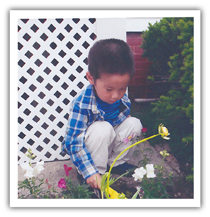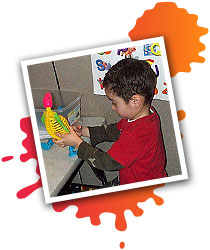Programs
We offer programs for Toddlers (18-36 mos.), Preschool (3 yrs. old), Pre-K (4 yrs. old), Kindergarten (5 yrs. old by September 1 of the school year), and Before and After School (6-10 yrs. old). We also offer a summer camp in all of our programs.
Our curriculum is written in alignment with the Rhode Island Early Learning and Development Standards, offering children a schedule balanced with group time and independent exploration; active time and quiet time.
Toddlers
"A two-year old wants everything NOW – ‘twos’ cannot wait." (Grace Mitchell, I Am, I Can). They will frequently say, "No", and have a real need to test limits. They begin to enjoy looking at books and listening to stories. Always very busy, toddlers need opportunity to run, climb, crawl, push, pull and roll! Solitary play becomes parallel play, and eventually, they are able to imitate the behavior of other children, as well as that of most adults, as in "eating breakfast" or "making dinner". Toddlers can best be described as energetic, impulsive, egocentric and WONDERFUL! Learning about the world is the main focus of a toddler, and it is with that goal in mind that we plan our curriculum at Breezy Knoll Child Care Center.
Activities in the Toddler Group
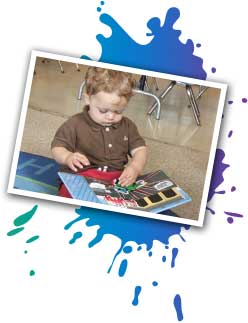 Circle Time - During this time, reading stories stimulates the imagination. Children are introduced to letters and numbers through repetitive songs and fingerplays. Music and dance both play an important role in circle time.
Circle Time - During this time, reading stories stimulates the imagination. Children are introduced to letters and numbers through repetitive songs and fingerplays. Music and dance both play an important role in circle time.
Fine Motor - During this time we introduce large crayons and markers, puzzles, blocks, pegs and manipulatives. This time helps to increase eye-hand coordination, as well as dexterity.
Gross Motor - Outside play is the greatest activity for large muscles. Riding toys, climbing low apparatus and swinging are encouraged activities. Inside we use a small trampoline, crawl through cloth tunnels, use small slides, and exercise to music.
Creativity Time - This is a time when we really like to focus on process versus product. During this time we encourage the toddler to explore various art mediums. Play dough, finger paints, collages, large crayons and markers are some of the materials used for manipulation. Creativity time offers many sensory learning experiences.
Music and Dance - Songs, rhymes and finger plays help children learn about rhythm, and counting time, and promote self expression. It’s also great fun to dance!
Free Play - This time allows children opportunity to make choices, share time with friends, interact socially, imitate through dramatic play, enhance their imagination, and learn self-control.
As teachers, our main focus at this age and stage is to enhance each child's self confidence to encourage independence and social interaction. In a supportive and nurturing setting, our goal is for the child to feel confident and willing to make his/her own choices and to discover that unique little self within!
![]()
Preschool
"Preschoolers are enthusiastic, adventurous, bold, "out of bounds", silly, eager, fun. They are excited and inquisitive about learning new things. They are quite uninhibited, and their imagination knows no bounds. Three-year-olds are generally eager to please and want to do things "right." Four-year-olds are imaginative, and like making faces, singing silly songs, and being funny. This is the pre-kindergarten year when there is a growing interest in letters and numbers and things academic, but they are not ready to "sit down and behave" for long periods of time." ( Karen Miller, Ages and Stages). The Preschool years are important ones for a child in preparing for kindergarten, and it is with that in mind that we align our preschool curriculum with the Rhode Island Early Learning Standards.
Experiences in the Preschool Group
Literacy - Through natural exposure to books, print, and conversations, children discover that written words carry a message. Early reading and writing skills are developed as children recognize that symbols are associated with letters of the alphabet and form words. They begin to print letters in their names and to recognize most of them. They will begin to dictate ideas, sentences and stories. While listening to stories, songs, and poems, children will begin to recognize and generate rhymes.
Mathematics - When children play in the sandbox or complete a puzzle, they are developing the thinking skills used in daily life. They develop vocabulary and skills to measure, describe patterns, and to express order and position. Children notice similarities and differences in objects and group their materials. The ability to organize information into categories and solve problems helps children to learn about time, space, and numbers.
Science - By cultivating a child’s sense of wonder, we help children to become scientific thinkers. The questions children ask about insects flying, or mixing paints, help them to collect and interpret data and to draw conclusions. They will explore time, temperature, and cause-effect relationships based on everyday experiences. Children will then ask new questions and satisfy their curiosity about the world around them.
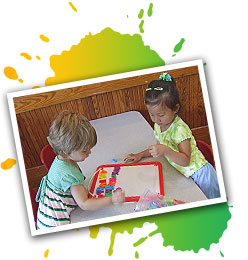 Creativity - Children experiment with sounds and motions, colors and forms. They will engage in individual or group activities that represent real-life experiences, expand upon prior knowledge, offer opportunities to express feelings, and explore fantasy. Children will express themselves, create, and learn about the arts through experiences with a variety of art forms and media.
Creativity - Children experiment with sounds and motions, colors and forms. They will engage in individual or group activities that represent real-life experiences, expand upon prior knowledge, offer opportunities to express feelings, and explore fantasy. Children will express themselves, create, and learn about the arts through experiences with a variety of art forms and media.
Physical Health and Development - Children use their senses and bodies to explore their physical environment. They will participate in games and outdoor play that enhance physical fitness. When using a variety of manipulative materials, they will develop hand-eye coordination, strength, and control. Children will begin to understand how daily activity and healthy behavior promote overall personal health and safety.
Free Choice Center Time - This time allows children opportunity to make choices and invest time in their personal areas of interest by visiting various centers within the classroom. They will interact socially, imitate through dramatic play, enhance their imaginations, and learn problem-solving skills.
As teachers, our main focus at this age is to provide each child with opportunities to acquire the skills necessary to enter kindergarten ready to succeed.. In a supportive and nurturing setting, our goal is for children to feel confident and willing to make their own choices.
![]()
Kindergarten
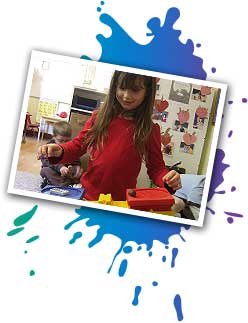 It is our philosophy to provide all children with a safe and nurturing environment, in which they can develop socially, emotionally, physically, cognitively and creatively. With this in mind, the Breezy Knoll Kindergarten Program will provide each child with experiences to promote optimum development at his/her own level. Through an integrated approach, all aspects of growth will be considered within this curriculum. It is our belief that children are unique individuals, with their own rate and style of learning, their own way of approaching a situation, and their own capacities. Growth takes place in orderly sequences. Each child has a different rate of growth, but sequence of stages is uniform. Age is only a general indication of what to expect, as each child differs in the time it takes to complete a stage. We will provide each child with a variety of experiences appropriate to those stages, enabling him/her to leave one stage behind, and to move on, prepared for the next. Learning is an interactive process. We, as teachers, must prepare the environment for children, so that they will learn through active exploration and interaction with adults, with other children, and materials.
It is our philosophy to provide all children with a safe and nurturing environment, in which they can develop socially, emotionally, physically, cognitively and creatively. With this in mind, the Breezy Knoll Kindergarten Program will provide each child with experiences to promote optimum development at his/her own level. Through an integrated approach, all aspects of growth will be considered within this curriculum. It is our belief that children are unique individuals, with their own rate and style of learning, their own way of approaching a situation, and their own capacities. Growth takes place in orderly sequences. Each child has a different rate of growth, but sequence of stages is uniform. Age is only a general indication of what to expect, as each child differs in the time it takes to complete a stage. We will provide each child with a variety of experiences appropriate to those stages, enabling him/her to leave one stage behind, and to move on, prepared for the next. Learning is an interactive process. We, as teachers, must prepare the environment for children, so that they will learn through active exploration and interaction with adults, with other children, and materials.
Description of the Kindergarten Program
At Breezy Knoll Child Care Center, our kindergarten program is based on the integrated curriculum approach. Using this philosophy, we will present language arts to children as a whole, functional and meaningful communication system. This approach is process oriented. The children will learn how all aspects of learning are connected. They will learn to read by reading, and to write by writing. As is our basic philosophy, this approach is child-centered. Our program will teach skills in the context of a whole approach by integrating listening, speaking, reading, writing, viewing and representing into meaningful, experiential learning. Workbooks will not be the focus of this program. Children will be taught skills in the context of the whole, specifically at a time when they have a reason to learn these skills.
Breezy Knoll Kindergarten will lay the foundation for first grade. The environment will be such that the children will feel safe and non-threatened, promoting social interaction and intellectual growth. Our rooms are arranged so that the children can learn the classroom 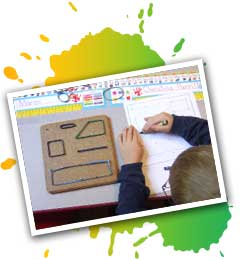 routine easily, and to take care of themselves and their belongings independently. Our rooms are filled with print, and we present language everywhere through labels, signs, charts, posters, stories and songs. Choice materials are easily accessible with labels on shelves for the child's recognition of the written symbol. Books and writing materials will be placed in each area. New items will be added during the year, as interest grows in various topics, and the need for new challenges is indicated.
routine easily, and to take care of themselves and their belongings independently. Our rooms are filled with print, and we present language everywhere through labels, signs, charts, posters, stories and songs. Choice materials are easily accessible with labels on shelves for the child's recognition of the written symbol. Books and writing materials will be placed in each area. New items will be added during the year, as interest grows in various topics, and the need for new challenges is indicated.
At Breezy Knoll, we are committed to teaching children, not fixed programs. We see children as individual, curious and natural learners. Our goal is to provide children with language-rich, integrated experiences, allowing children to far exceed the boundaries of any program. Our curriculum includes meaningful experiential learning that promotes positive feelings toward learning.
Kindergarten Goals
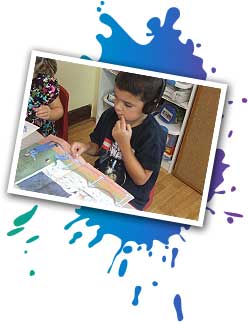 Our program will provide:
Our program will provide:
- an integrated curriculum that will include age appropriate experiences and activities.
- a child-centered program that stimulates learning in all developmental areas - physically, emotionally, socially, and cognitively.
- a program that will teach skills by integrating listening, speaking, reading, writing, viewing, and representing into meaningful experiential learning.
- to promote opportunities that encourage self-control, independence, and self-reliance.
- activities that are designed to develop a child's self-esteem and to promote positive feelings towards learning.
- experiences that encourage learning from self-directed problem solving and experimentation.
- opportunities that enhance creative expression through the arts, dramatic play, storytelling and music.
- activities to develop fine motor skills, strength and coordination.
- experiences to develop gross motor skills through movement.
![]()
School Age
The emphasis of our School Age Program is to offer children experiences that contribute to their physical, social, emotional and intellectual development. We offer your child a safe and friendly environment that allows your child to explore the world around us. Our goal is to provide each child with experiences that will promote his/her optimum development at his/her own level.
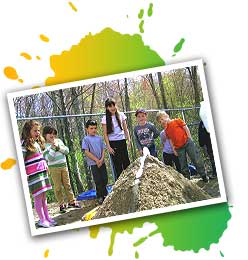 At Breezy Knoll we believe each child is an individual and we plan for these differences. Our School Age Program gives the children an opportunity for a variety of experiences. Students learn to cooperate in a group and to experience a variety of recreational, sport, and creative activities. Our many activities allow the children to learn more about their community and the world around them.
At Breezy Knoll we believe each child is an individual and we plan for these differences. Our School Age Program gives the children an opportunity for a variety of experiences. Students learn to cooperate in a group and to experience a variety of recreational, sport, and creative activities. Our many activities allow the children to learn more about their community and the world around them.
Parents are very important to us as part of our School Age Program. Our goal is to establish an open, friendly, and cooperative relationship with each student's family to encourage participation and involvement in the program, and to support your relationship with your child. We encourage you to participate in any way possible, and we always welcome new ideas. We encourage you to visit whenever you like and get to know the staff. It is our commitment to work cooperatively for the benefit of your child. We offer systems for support and open communication.
We pledge our commitment to set forth the highest standards to meet your child's needs.
PROGRAM OBJECTIVES:
- Provide a safe and healthy environment
- Create an environment that is appealing to children
- Teach socially acceptable techniques for expressing feelings and solving problems
- Promote a healthy self-concept
- Provide rewarding and fun learning experiences
- Teach independent living skills
- Create an environment that meets individual needs
- Create a warm and caring environment
- Arouse interest in literature and the arts
- Provide recreational activities and HAVE FUN! FUN! FUN!
